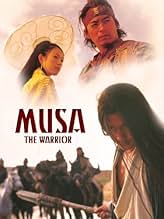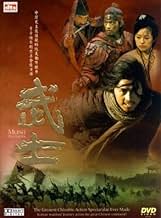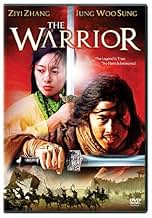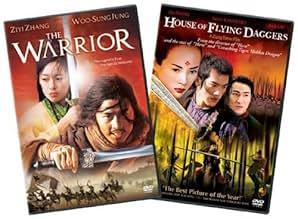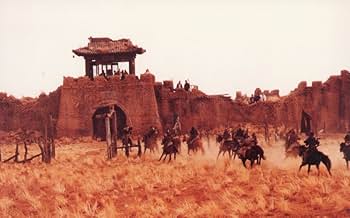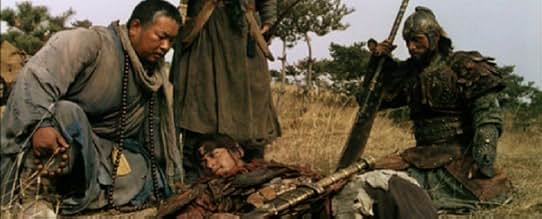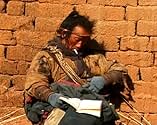1375. Nine Koryo warriors, envoys exiled by Imperial China, battle to protect a Chinese Ming Princess from Mongolian troops.1375. Nine Koryo warriors, envoys exiled by Imperial China, battle to protect a Chinese Ming Princess from Mongolian troops.1375. Nine Koryo warriors, envoys exiled by Imperial China, battle to protect a Chinese Ming Princess from Mongolian troops.
- Awards
- 6 wins & 11 nominations total
Ziyi Zhang
- Princess Bu-yong
- (as Zhang Ziyi)
Park Jeong-hak
- Ga-nam
- (as Park Jung-hak)
Jeong Mi-nam
- Yongho Soldier
- (as Mi-Nam Jung)
- Director
- Writer
- All cast & crew
- Production, box office & more at IMDbPro
Featured reviews
10skduncan
Based on actual events, Korean diplomats were sent into China with military escorts in 1375. Remember Europe was emerging from the Dark Ages at this time, but in Asia they were an advanced civilization. With the rise of the famous Ming Dynasty in China and the waning days of the Mongols, the Korean emperor was eager to formalize ties with the new Chinese government. This is the story of one of the those diplomatic missions.
This is an epic film, shoot over 9000 miles of China's northern region. Covering plains, prairies, forests, deserts and coastline. The cinematography is beautiful.
Though this is a Korean film, it utilizes the famous Chinese actress Zhang Ziyi, who portrays a kidnapped daughter of the Chinese Emperor.
Throughout most of the film the Korean warriors speak Korean. The Princess and the Chinese villagers speak Mandarin. Interestingly the Mongols also speak Mandarin to each other, historically inaccurate but Mongols don't go to movies these days. Some of the Koreans can also speak Mandarin. This is accurate since the educated Koreans of the time, could read, write and speak Chinese. This film is subtitled in English.
This is a grand story of honor, sacrifice and overcoming overwhelming odds. The Korean warriors must fight the larger forces of the Mongols. Using tactics and strategies not unlike that which you can find in Sun Tzu's the Art of War writings.
If you want some insight into the culture and attitudes of the people of this region, Musa is the movie for you.
This is an epic film, shoot over 9000 miles of China's northern region. Covering plains, prairies, forests, deserts and coastline. The cinematography is beautiful.
Though this is a Korean film, it utilizes the famous Chinese actress Zhang Ziyi, who portrays a kidnapped daughter of the Chinese Emperor.
Throughout most of the film the Korean warriors speak Korean. The Princess and the Chinese villagers speak Mandarin. Interestingly the Mongols also speak Mandarin to each other, historically inaccurate but Mongols don't go to movies these days. Some of the Koreans can also speak Mandarin. This is accurate since the educated Koreans of the time, could read, write and speak Chinese. This film is subtitled in English.
This is a grand story of honor, sacrifice and overcoming overwhelming odds. The Korean warriors must fight the larger forces of the Mongols. Using tactics and strategies not unlike that which you can find in Sun Tzu's the Art of War writings.
If you want some insight into the culture and attitudes of the people of this region, Musa is the movie for you.
Those who settle down to enjoy the excellent 150-odd minute Musa will be surprised at how much it suggests a Western. There's sweeping landcapes, a cross-desert ordeal; competition between villains and heros, 'stagecoach' chases, abandoned and defended forts, and 'cavalry' charges. These, as well as a strong sense of a man-having-to-do what-a-Man-has-to-do, combine to create familiarity to those who know such films as (for instance) The Alamo and Commanche Station. That's not to say that Musa has no originality, or is not strongly rooted within Korean national cinema. It contains a number of striking set pieces - notably the several pitched battle scenes, multiple characterisation, as well as some insight into the various power struggles which make up mid-fourteenth century Asian history. But at the heart of this package remain a well-tried fairy story, that of a cold Princess who must learn to swallow her pride, and of a brave servant's unrequited love.
Sung-Su Kim, who directs from his own screen play, does a very good job in drawing together his disparate group of travelling companions on a dangerous journey: a Princess, a General, a monk, soldiers, wives, a cowardly translator, a whore, etc. To provide suitable contrast between the moments of combat, he relates them in short, effective, dialogue scenes. Its good to see a film too in which the ubiquitous wire work and over the top gymnastics, beloved by some Eastern action directors, is conspicuous by its absence. Its also one where the director relies less on extreme camera angles and special effects to create visual drama than on the regular ebb and flow of dramatic editing. Perhaps because of this 'naturalness', the battle scenes are consistently exciting and involving. They are also staged in enough different locales to make them varied viewing each time. A standout is a desperate confrontation amongst trees, where the director takes full advantage of foliage cover, confusion, and events within the frame to create some real martial suspense.
The HK disc I saw was generally excellent, with occasional errors in subtitle grammar, as well as the odd compression problem (on-screen blur), usually during horizontal tracking movements. All told, though, the cheap price of this disk makes it an excellent buy and I strongly recommend it - and the film.
Sung-Su Kim, who directs from his own screen play, does a very good job in drawing together his disparate group of travelling companions on a dangerous journey: a Princess, a General, a monk, soldiers, wives, a cowardly translator, a whore, etc. To provide suitable contrast between the moments of combat, he relates them in short, effective, dialogue scenes. Its good to see a film too in which the ubiquitous wire work and over the top gymnastics, beloved by some Eastern action directors, is conspicuous by its absence. Its also one where the director relies less on extreme camera angles and special effects to create visual drama than on the regular ebb and flow of dramatic editing. Perhaps because of this 'naturalness', the battle scenes are consistently exciting and involving. They are also staged in enough different locales to make them varied viewing each time. A standout is a desperate confrontation amongst trees, where the director takes full advantage of foliage cover, confusion, and events within the frame to create some real martial suspense.
The HK disc I saw was generally excellent, with occasional errors in subtitle grammar, as well as the odd compression problem (on-screen blur), usually during horizontal tracking movements. All told, though, the cheap price of this disk makes it an excellent buy and I strongly recommend it - and the film.
Someone insulted the Korean movie industry by stating this is one of Korea's best films. I must be honest, I couldn't get myself to see the entire movie, which is a rarity for me. By the time I decided to stop torturing myself the following had occurred in the movie.
1)The tempermental and rebellious "hero" who has a serious self control problem gets the entire ancient Korean Caravan in trouble with his psychotic propensity towards violence. The Caravan saves themselves and the hero with cunning and wit. 2)The "hero" puts the entire Caravan in jeopardy again by cutting off the head of one of the merchants. This time many Caravan members die but they still escape relatively intact. 3)The Caravan finds a way to escape from their dire situation but the "hero" puts an end to their salvation by doing something totally stupid and irrational. Again, the great leadership, solidarity, and fighting ability of the Caravan saves them from disaster.
By this time, I began to beg someone to have the senses to kill the "hero" who was getting everyone else killed with his irresponsible actions. Instead of languishing in frustration, I decided to use my remote control.
The "hero" is played by Jung Woo Sung, one of the worst, and yet one of the most popular, actors in Korea. The only characters he usually plays are the silent rebellious types who act angry all the time, probably to hide his lack of acting ability.
This was the most expensive movie made in Korea (few films have surpassed it since). Yet it was a box office bomb, and with a good reason.
1)The tempermental and rebellious "hero" who has a serious self control problem gets the entire ancient Korean Caravan in trouble with his psychotic propensity towards violence. The Caravan saves themselves and the hero with cunning and wit. 2)The "hero" puts the entire Caravan in jeopardy again by cutting off the head of one of the merchants. This time many Caravan members die but they still escape relatively intact. 3)The Caravan finds a way to escape from their dire situation but the "hero" puts an end to their salvation by doing something totally stupid and irrational. Again, the great leadership, solidarity, and fighting ability of the Caravan saves them from disaster.
By this time, I began to beg someone to have the senses to kill the "hero" who was getting everyone else killed with his irresponsible actions. Instead of languishing in frustration, I decided to use my remote control.
The "hero" is played by Jung Woo Sung, one of the worst, and yet one of the most popular, actors in Korea. The only characters he usually plays are the silent rebellious types who act angry all the time, probably to hide his lack of acting ability.
This was the most expensive movie made in Korea (few films have surpassed it since). Yet it was a box office bomb, and with a good reason.
I think it was nearly a year ago that I came across the website and first started anticipating the movie eagerly. The site contained lots of stills from the movie throughout, and every single one of them was utterly beautiful, like it had been painted to perfection rather than captured in motion. It seemed unreasonable to expect the whole movie to look that good, but I was pretty sure that it was going to be impressive. With so much anticipation and hope for a movie, it seems almost inevitable that you are going to be disappointed when you finally see it. All the more surprise then that MUSA meets and surpasses my expectations in every way!
First things first, yes... it really does look that good! All the way through . Like Zhang Yimou's SHANGHAI TRIAD, practically every frame is beautifully composed and rendered, and could easily hang on a gallery wall somewhere. There wasn't a single shot that I could imagine looking better than it did. The production design is incredible, the locations stunning, the special effects groundbreaking (the gore). I can't imagine how much time and money must have gone into its production, let alone talent and dedication.
MUSA is epic in the word's biggest sense - I couldn't help thinking of Homer's ILIAD and ODDYSEY in many parts, and those are basically the two stories that the word 'epic' was invented for. It makes Gladiator, Crouching Tiger etc look positively inconsequential. The movie is also made with an attention to detail that is remarkable. It is certainly the most convincing evocation of [relatively] ancient times that I have seen. You will really believe that you've been transported back to 400 something AD China, where Zhang Ziyi happens to be a princess and Yu Rong Guang a Mongol general. I really felt "Yes, this is what life was like back then. This is how things looked, this is how people behaved".
Despite the epic nature of the story, the central focus is always on a small-ish cast of characters, each of whom is very well conceived and developed throughout the movie's course. I'd guess there's about 15 major characters in the story, and a significant cast of minor characters. The performances are all superb - I'm pretty sure the actors themselves were quite convinced they really were their characters. The believability is enhanced by the costuming, makeup and I guess just good casting - all the different factions involved in the story totally look the part.
No epic would be complete without battle scenes, and MUSA has quite a few. These are all stunningly choreographed and filmed, not in a HK style like Bichunmoo, but in a completely real style. Beautifully shot of course, but the men fight like skilled soldiers really would (I'm sure), and get wounded/killed equally convincingly. The special effects of arrows and blades penetrating flesh are sometimes shockingly convincing. This might be disturbing to some, but it isn't played for titillation - it just adds to the gravity of the experience. It may be a little conspicuous that the heroes all manage to dispatch many times their own body weight in enemies, but you've got to give them *some* leeway for narrative convention .
There is a lot of planning involved in the battles, of a military nature, and this is also very convincing and fascinating. Almost as large a part of the process as the actual getting down to it with the weapons. A very believable insight into how battles were waged in the days when a bow & arrow was as hi-tech as weaponry got.
Hmmm... is there any aspect of the movie I haven't gushed praise over yet? A nod to the soundtrack I guess - good, very fitting. Sound effects in the battles are excellent. Ummm... and the lighting is really good too .
A cursory nod must be made to the films flaws as well though, lest I leave the reader with expectations of *total* perfection. The main flaw is that the movie wanders rather too far into melodrama & a little cliche towards the end. It would probably be kind of cheesy, except that it's all so well done you can't get too upset with it .
First things first, yes... it really does look that good! All the way through . Like Zhang Yimou's SHANGHAI TRIAD, practically every frame is beautifully composed and rendered, and could easily hang on a gallery wall somewhere. There wasn't a single shot that I could imagine looking better than it did. The production design is incredible, the locations stunning, the special effects groundbreaking (the gore). I can't imagine how much time and money must have gone into its production, let alone talent and dedication.
MUSA is epic in the word's biggest sense - I couldn't help thinking of Homer's ILIAD and ODDYSEY in many parts, and those are basically the two stories that the word 'epic' was invented for. It makes Gladiator, Crouching Tiger etc look positively inconsequential. The movie is also made with an attention to detail that is remarkable. It is certainly the most convincing evocation of [relatively] ancient times that I have seen. You will really believe that you've been transported back to 400 something AD China, where Zhang Ziyi happens to be a princess and Yu Rong Guang a Mongol general. I really felt "Yes, this is what life was like back then. This is how things looked, this is how people behaved".
Despite the epic nature of the story, the central focus is always on a small-ish cast of characters, each of whom is very well conceived and developed throughout the movie's course. I'd guess there's about 15 major characters in the story, and a significant cast of minor characters. The performances are all superb - I'm pretty sure the actors themselves were quite convinced they really were their characters. The believability is enhanced by the costuming, makeup and I guess just good casting - all the different factions involved in the story totally look the part.
No epic would be complete without battle scenes, and MUSA has quite a few. These are all stunningly choreographed and filmed, not in a HK style like Bichunmoo, but in a completely real style. Beautifully shot of course, but the men fight like skilled soldiers really would (I'm sure), and get wounded/killed equally convincingly. The special effects of arrows and blades penetrating flesh are sometimes shockingly convincing. This might be disturbing to some, but it isn't played for titillation - it just adds to the gravity of the experience. It may be a little conspicuous that the heroes all manage to dispatch many times their own body weight in enemies, but you've got to give them *some* leeway for narrative convention .
There is a lot of planning involved in the battles, of a military nature, and this is also very convincing and fascinating. Almost as large a part of the process as the actual getting down to it with the weapons. A very believable insight into how battles were waged in the days when a bow & arrow was as hi-tech as weaponry got.
Hmmm... is there any aspect of the movie I haven't gushed praise over yet? A nod to the soundtrack I guess - good, very fitting. Sound effects in the battles are excellent. Ummm... and the lighting is really good too .
A cursory nod must be made to the films flaws as well though, lest I leave the reader with expectations of *total* perfection. The main flaw is that the movie wanders rather too far into melodrama & a little cliche towards the end. It would probably be kind of cheesy, except that it's all so well done you can't get too upset with it .
10abisio
There are several kinds of War movies. Some most interested in the romance (I do not know why but there are a lot of them) using the war as a background and others only in the facts and history.
MUSA or THE PRINCESS WARRIOR is probably in between. Because this war and almost everything that happens here is related to an unfinished love story between three characters (if you think is stupid, remember Homer's ILIADA and the reason of the Trojan War).
About seven centuries ago, Chinese got divided and a diplomatic mission from the Koryo kingdom (protected by small group of soldiers), try to make peace with the Ming dynasty. The Ming's army refuses to accept the ambassadors and escort the whole group out of the country. In the dessert, Mongolian's forces attack and kill the Ming's soldiers releasing the Koryo people in the dessert.
An ambitious, very tough (and young) Koryo general, tries to lead his people back to his country, until they found a Mongolian group carrying a Ming's princess prisoner. Engaged by the woman's beauty, he decides to rescue her, justifying his actions as a political opportunity.
Meanwhile, an ex-slave (released by the noble Ambassador before dying in the dessert), itself a great but silent warrior, gets involved in the rescue and after showing his courage and ability in combat, is forced to protect the Princess, creating obvious jealousy on the young general.
Mongolian's of course, will not accept being defeated, so they run after the small group, to recover the princess.
What happens after (the movie is more than two and a half hours long but never boring) is somehow predictably; however this is a Korean movie, so do not expect the silly and forced happy ending. What make the movie worth (a 10 / 10) is the way things are told, the beauty of the images and the poetry surrounding the story.
This movie war movie, but is not glorifying war, but the honor of people fighting for their countries. This is a love story, but a real one, were words are unnecessary and everything that happens is inside every character, but just looking at their eyes, we know what exactly are their feelings.
Halfway through the film, we realize that the line between bad and good guys is not really clear. That the real enemy is sometimes on the same side.
There are a lot of small characters, and everyone gets enough screen time, to make us care about them; sometimes even more than the main characters.
A special mention deserves the numerous war scenes. Using a slow motion, first person shots, quick editing and almost every camera trick you could imagine, you will feel in the middle of the battlefield (and a very scary one ). The blood and violence are much more realistic, than BLACK HAWK DOWN or WHEN WE WERE SOLDIERS, and the impression created is more than those two plus any other recent war related.
In brief; as far as I know this movie did not get a cinema release, but you can find it in EBAY or in some special video stores. DO NOT MISS IT; is probably the best movie of the year.
MUSA or THE PRINCESS WARRIOR is probably in between. Because this war and almost everything that happens here is related to an unfinished love story between three characters (if you think is stupid, remember Homer's ILIADA and the reason of the Trojan War).
About seven centuries ago, Chinese got divided and a diplomatic mission from the Koryo kingdom (protected by small group of soldiers), try to make peace with the Ming dynasty. The Ming's army refuses to accept the ambassadors and escort the whole group out of the country. In the dessert, Mongolian's forces attack and kill the Ming's soldiers releasing the Koryo people in the dessert.
An ambitious, very tough (and young) Koryo general, tries to lead his people back to his country, until they found a Mongolian group carrying a Ming's princess prisoner. Engaged by the woman's beauty, he decides to rescue her, justifying his actions as a political opportunity.
Meanwhile, an ex-slave (released by the noble Ambassador before dying in the dessert), itself a great but silent warrior, gets involved in the rescue and after showing his courage and ability in combat, is forced to protect the Princess, creating obvious jealousy on the young general.
Mongolian's of course, will not accept being defeated, so they run after the small group, to recover the princess.
What happens after (the movie is more than two and a half hours long but never boring) is somehow predictably; however this is a Korean movie, so do not expect the silly and forced happy ending. What make the movie worth (a 10 / 10) is the way things are told, the beauty of the images and the poetry surrounding the story.
This movie war movie, but is not glorifying war, but the honor of people fighting for their countries. This is a love story, but a real one, were words are unnecessary and everything that happens is inside every character, but just looking at their eyes, we know what exactly are their feelings.
Halfway through the film, we realize that the line between bad and good guys is not really clear. That the real enemy is sometimes on the same side.
There are a lot of small characters, and everyone gets enough screen time, to make us care about them; sometimes even more than the main characters.
A special mention deserves the numerous war scenes. Using a slow motion, first person shots, quick editing and almost every camera trick you could imagine, you will feel in the middle of the battlefield (and a very scary one ). The blood and violence are much more realistic, than BLACK HAWK DOWN or WHEN WE WERE SOLDIERS, and the impression created is more than those two plus any other recent war related.
In brief; as far as I know this movie did not get a cinema release, but you can find it in EBAY or in some special video stores. DO NOT MISS IT; is probably the best movie of the year.
Did you know
- TriviaDuring filming in China, Woo-sung Jung got knee-injury while shooting one of his fight scenes and had to stay behind after the Korean crew came back to Korea.
- Quotes
Princess Bu-yong: You could have killed me! I am a Princess!
Yeo-sol: Stop yelling at me! Don't think you can do anything you like just because you are a Princess!
Princess Bu-yong: Unhand me!
[English translation subtitles from Mandarin Chinese in Korean language film]
- Alternate versionsInternational version runs ca. 25 minutes shorter.
- ConnectionsReferenced in Je te promets (2012)
Details
Box office
- Budget
- BND 8,000,000 (estimated)
- Gross worldwide
- $945,922
- Runtime
- 2h 38m(158 min)
- Color
- Sound mix
- Aspect ratio
- 2.35 : 1
Contribute to this page
Suggest an edit or add missing content





